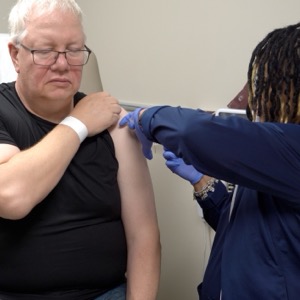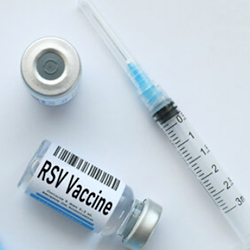Originally published by our sister publication Gastroenterology & Endoscopy News
By Joe Morreale
Patients with inflammatory bowel disease are at increased risk for respiratory syncytial virus (RSV) infection, according to new research presented at the 2023 annual meeting of the American College of Gastroenterology.
Although patients with IBD are at an increased risk for developing respiratory infections, research has been limited about RSV in this setting, according to the researchers, led by Ryan A. Smith, MD, a gastroenterology fellow at the University of Wisconsin–Madison. He and his co-investigators wanted to evaluate whether patients with IBD are at an increased risk for RSV infection because that information can assist in informing appropriate vaccination strategies now that RSV vaccines are available.
Noting that there are no treatments available for adults with IBD who are infected with RSV infection, senior researcher Freddy Caldera, DO, MS, said, “The best we can do is make sure patients are vaccinated to help prevent serious infections.”
The researchers conducted a retrospective study to assess the risk for RSV infection in patients with IBD compared with a cohort of healthy controls using data from the TriNetX database (oral abstract 31).
They found the IBD cohort was at an increased risk for RSV infection (adjusted odds ratio [aOR], 2.24; 95% CI, 1.96-2.55) compared with the control group. Patients with IBD and comorbidities—such as cardiovascular disease (aOR, 1.18; 95% CI, 1.01-1.37; P=0.03), type 2 diabetes mellitus (aOR, 1.20; 95% CI, 1.007-1.44; P=0.04), chronic lung disease (aOR, 1.21; 95% CI, 1.06-1.39; P=0.003) and chronic kidney disease (aOR, 1.52; 95% CI, 1.21-1.92; P=0.0003)—had an additional increased risk for RSV infection. Patients with IBD taking certain medications—such as anti–tumor necrosis factor therapies (aOR, 1.66; 95% CI, 1.10-2.52; P=0.01), 5-aminosalicylic acid (aOR, 1.77; 95% CI, 1.39-2.25; P<0.0001), and thiopurines and methotrexate combination therapy (aOR, 3.06; 95% CI, 2.09-4.49; P<0.0001)—also were at an increased risk for RSV infection.
The findings suggest increased evaluation for RSV may be necessary, explained Dr. Caldera, an IBD specialist and associate professor of gastroenterology University of Wisconsin–Madison. “There is lots of evidence in the general population that RSV is underdiagnosed due to lack of awareness,” Dr. Caldera said. “As GI providers, we should ensure that patients with IBD with respiratory infections are evaluated for RSV.”
Evaluation can be critical, as the researchers also found that patients with IBD were at an increased risk for hospitalization once infected with RSV compared with those without IBD (aOR, 1.36; 95% CI, 1.09-1.69). Due to this increased risk, the researchers advised that all adults with IBD may benefit from the new RSV vaccine recommended for adults aged 60 years and older. “Our findings suggest that GI providers should educate patients with IBD that they are at increased risk for RSV,” Dr. Caldera said, “and recommend [that] all eligible patients get vaccinated.”
Dr. Caldera reported a financial relationship with GSK, maker of the RSV vaccine Arexvy.





